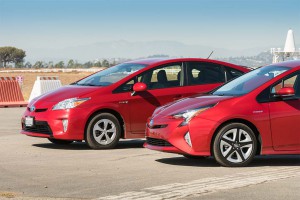
A new report shows that the cost of technology that improves fuel economy and emissions is less than predicted by regulators.
A new study by the International Council on Clean Transportation, which reviewed the history of clean air regulations in the United States, the European Union and China, found that regulators have routinely inflated the costs of automotive technology that would benefit the environment.
Last week, the Trump administration announced that it will reopen the review of national fuel-economy standards for model years 2022-25. The report comes as the California Air Resources Board will make a decision, based on its own technical assessment, whether states representing 113 million people will stick with the current program.
Automakers and other supporters of delaying the 2022-25 standards express concern about the cost associated with achieving tougher fuel economy and emissions standards and the impact on their bottom lines.
“Technology costs continue to decrease, proving that previous estimates, including those made by the federal regulatory agencies, have been too conservative. State-of-the-art engineering studies and emerging supplier technology developments indicate that costs for light-weighting, direct injection, and cooled exhaust gas recirculation will be reduced by hundreds of dollars, and electric vehicle costs will drop by thousands of dollars per vehicle by 2025,” the report said.
Including these latest efficiency developments, compliance costs for the adopted 2025 standards will be 34%–40% lower than projected in the latest U.S. midterm evaluation regulatory analysis, according to the report from ICCT, which helped uncover the Volkswagen AG cheating on emission tests.
(Trump announces CAFE rule review will be reopened. Click Here for the story.)
The technology assessment also indicates that the average payback period will become even more advantageous to first vehicle owners than the regulatory agencies suggested, and that spreads across a variety of areas including possible increases in vehicle sales and positive effects on jobs.
“Understanding advanced vehicle efficiency technologies and their potential to reduce oil use and emissions is critical, as governments around the world continue to seek ways to accelerate their deployment through regulatory efficiency standards,” the report said.
Noting the three largest automotive markets, the U.S., Europe, and China, are in various stages of development toward meeting 2025 efficiency standards. Regulators have to decide how much efficiency technology is available to improve internal combustion vehicles, how much the fleet will need to transition to electric vehicles to meet efficiency and carbon dioxide (CO2) targets and what the associated costs are.
(CARB, EPA on track for emission showdown. Click Here for details.)
This report analyzed emerging vehicle efficiency technologies, their ability to achieve lower emission levels, and their costs in the 2025–2030 timeframe. The analysis is focused on providing an update to the U.S. midterm regulatory analysis for new 2025 vehicles, as well as estimating the potential and cost of continued improvements through 2030.
The analysis was based on U.S. government data, state-of-the-art modeling, and underlying peer-reviewed reports.
It found that standards that get progressively more stringent, at 4%–6% lower fuel use per mile annually from 2025 to 2030, can be achieved cost-effectively.
(For more on the EPA’s mileage decision, Click Here.)
Those standards would result in modest, gradual vehicle price increases through 2030, and with two to three times greater consumer fuel savings than costs. They could be achieved mostly with advanced combustion technology, while also initiating the wider launch of plug-in electric vehicles to 13%–23% of the new vehicle fleet. The ultimate result is a jump in the fuel economy for the new vehicle fleet from 26 miles per gallon in 2016 up to 42–46 miles per gallon by 2030.
